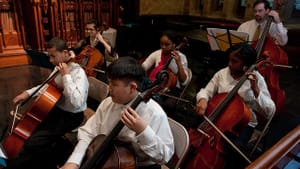Stay in the Loop
BSR publishes on a weekly schedule, with an email newsletter every Wednesday and Thursday morning. There’s no paywall, and subscribing is always free.
Musicopia String Orchestra

For me, it was the libraries and the paperback book racks. The schools I attended in various states ranged from the good to the irrelevant, but I always had access to libraries and I started reading adult books during the paperback boom that followed World War Two. Paperback books were as ubiquitous as ice cream sodas. I bought Shakespeare’s tragedies in a drugstore in New Haven when I was nine and Plato’s dialogues from a sidewalk newsstand in Tampa when I was thirteen. The libraries and the paperbacks connected me to the grandest levels of human culture and that culture has been giving me guidance, pleasure, and emotional support ever since.
For other people the link may be painting or music. In Philadelphia, one of the most important components in the musical delivery system is an organization called Musicopia. It’s the major organization combating the devastation budget cuts have inflicted on public school music education.
Musicopia provides musical opportunities for school children from kindergarten through high school. In 2013, it worked with 25 Philadelphia schools. It concentrates on schools in the poorest areas of the city, offering musical opportunities to children in schools such as the bilingual Eugenio Maria de Hostos Charter School in Hunting Park; Andrew Jackson School in South Philadelphia; and St. Martin de Porres in North Philadelphia. Its programs include a string orchestra, a chamber orchestra, free private music lessons, a percussion group called the Musicopia Drum Line, a guitar ensemble, and support for programs that would have been eliminated by the budget cuts, such as the After School Choir of the Albert M. Greenfield School in Center City. Its Gift of Music program collected and distributed 580 “gently used or new” instruments in 2013 alone.
Its most visible program is the Musicopia String Orchestra. Sixty students, ages 8 to 17, rehearse every Tuesday evening at 7:30 at First Presbyterian Church at 21st and Walnut. Sixty-one percent of the students in the MSO receive financial aid, but Musicopia doesn’t limit the orchestra to students who need aid. It operates programs in the suburbs, too, and attracts young musicians whose parents can afford the $650 tuition. Children from both types of backgrounds sit side by side in the orchestra and get to know one another, fulfilling one of the oldest ideals of public education in a democracy.
Taking music seriously
If you drop by First Presbyterian on a Tuesday evening, you’ll discover it’s a busy place. The String Orchestra rehearses in the church’s coffee hour assembly room, another group works in the sanctuary, and auditions may be taking place in other rooms. Students who arrive early can receive an extra lesson in a small group, thanks to a recent grant.
I heard the string orchestra for the first time in November, when they joined Choral Arts Philadelphia in a concert commemorating Benjamin Britten’s hundredth birthday. For their turn in the spotlight, they played the pizzicato movement of Britten’s Simple Symphony — a piece that requires precise coordination among the four voices. When I visited a Tuesday rehearsal session, they were working on the first movement of the symphony and preparing for a performance at the Barnes.
Their conductor, Daniela Pierson, possesses the ideal personality for the job. She was low-key and supportive, but she maintained high standards. You could tell the students were all concentrating on their work.
They stick with it, too. According to Musicopia’s energetic executive assistant, Debbie Singer, most of the students who join the string orchestra stay until they graduate from high school. A few drop out when they hit ninth grade and find high school challenging, but some come back. A number of students advance to the Philadelphia Youth Orchestra — the next rung in the Philadelphia youth music hierarchy. Several have become students of Philadelphia Orchestra musicians.
Music educators can point to studies that show music programs foster self-esteem, teach children the value of study, and improve grades. Most of the people responsible for marketing classical music will tell you childhood musical training is the best way to build future audiences. Half the people you meet at chamber music concerts took lessons when they were young. Many are still playing.
Much as I favor all those worthy causes, the rehearsal stimulated a more personal thought.
The pizzicato movement of the Simple Symphony is a lighthearted piece. The first movement is more serious. Watching those intent young people produce its somber, very adult emotions made me think of my youthful encounters with Shakespeare’s language and Socrates’s speech to the Athenians who sentenced him to death. The Musicopia students were working with a different medium, but they were receiving the same gifts. They were broadening the range of their emotional life. They were connecting with a tradition that teaches you there is more to life than the things we learn from our immediate, day-to-day surroundings. They were receiving the most important treasure education has to offer, whether it’s delivered through words or a bow sliding across a vibrating string.
Musicopia, 215-829-9522, www.musicopia.net. Denise Kinney, Executive Director.
Musicopia String Orchestra Spring Concert, Sunday, June 1, 2014, 4:30pm, The Church of the Holy Trinity, 1904 Walnut Street, Philadelphia. Admission to the concert is free; donations are welcome.
Sign up for our newsletter
All of the week's new articles, all in one place. Sign up for the free weekly BSR newsletters, and don't miss a conversation.

 Tom Purdom
Tom Purdom